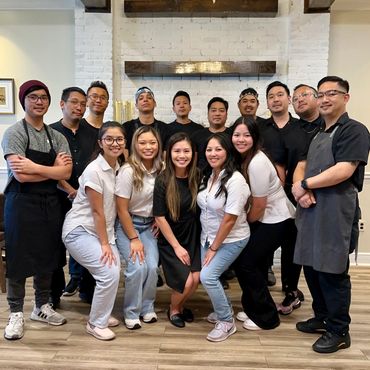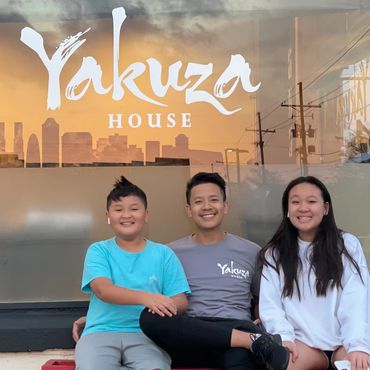About Yakuza House
Our Story
Huy Pham’s journey to opening Yakuza House isn't just a business story; it's a raw, deeply personal account of a kid who learned to hustle, faced down rejection, and ultimately built his dream from sheer grit and a whole lot of heart. His restaurant isn't just a place to eat; it's a testament to every struggle, every late night, and every moment he felt like an "outcast."
From Kitchen Helper to Culinary Obsession
Huy’s story starts where many chefs' do, but with a unique twist of necessity. "My mom had restaurants when I was young, and I was raised in that environment," he recalls. At just 14, he wasn't just helping out; he was pulling his weight. "Seeing the hustle and bustle of a restaurant made me realize how hard work was needed to earn a living." As the only boy among six children, with a single mom, there was no "blueprint." All he knew was he had to help with bills and survival.
His first real kitchen job, outside his family's short-lived venture, was at Café Zen, a Japanese spot. He admits he "knew nothing about it," but something clicked. "When I got hired, I instantly felt like I was welcome as a family member," he says. His interest quickly spiraled into an "obsession" with Japanese cuisine and culture. Under Chef Hiro-San, he learned the ropes, an "eye-opener" that solidified his path.
The Weight of a Head Chef Title at 17
A close friend saw his drive and offered him a job at Rock-n-Sake downtown. Suddenly, at a "ripe young age of 17"—an age when he "was supposed to be in a graduating high school"—Huy was thrown into the head chef position. He thought, "it was my moment." But the harsh reality quickly set in. "I was only there to lower the overhead they were paying for the older chefs, and my confidence shot down like nothing I’ve felt before." He endured it for five years, a tough lesson in the unforgiving side of the industry.
Then came Hurricane Katrina, turning New Orleans upside down. When Rock-n-Sake's partners split, Huy seized an opportunity, heading to Long Island, New York, to open another Rock-n-Sake. It was a "great experience to open my eyes to different types of the food scene," a chance to grow beyond the city's confines.

A Search for Progression and a Father-in-Law's Wisdom
After two years, family called him back to New Orleans. He found a new home at Bamboo Restaurant in Harrah’s Casino, where Chef Phillip Chan "believed in me," giving him the freedom to "order and work with things I have only dreamed of." But Bamboo closed, and Huy found himself bouncing from restaurant to restaurant—Sakura, Kakkoi, Little Tokyo, Daiwa, and finally, ShoGun. "Everywhere I went, I felt like I wasn’t progressing," he admits, a restless feeling that something more was out there.
Then, 2020 hit, and with it, the pandemic. COVID-19 forced him to "reevaluate my life as a whole person." He was staying with his then-girlfriend, now wife, desperately looking for work outside of kitchens. "I applied to everything underneath the sun: mailman, work for Entergy, go back to school, researching how to dropship, sell items on Amazon, and even try to learn the stock market."
It was her dad, a shrimper his whole life and owned his own boat, who cut through the noise. "What was I doing?" he asked. Huy explained his job hunt. His father-in-law looked at him and simply stated, "haven’t you been doing sushi for like 20 years now?" When Huy said yes, the wisdom came: "it doesn’t make sense to change professions now." His father-in-law then shared his own life's journey, concluding with a powerful truth: "it was nothing but excuses. If you want something, you go get it." That conversation, Huy says, "is when the Yakuza House journey began for him."

Building a Dream, One Scrappy Step at a Time
With renewed purpose, Huy worked tirelessly. "I was working at ShoGun at the time: 6 days a week, 8am-11pm." After those grueling shifts, he’d go home and dive into proformas, researching how to open a restaurant. He crafted his plans, crunched numbers, and faced rejection after rejection from six different banks. But then, a glimmer of hope: a recommendation led him to Diana Scalifini at JEDCO. "Diana was GOD SENT!" he exclaims. She helped him secure a $50,000 loan. "That’s pennies to the dollar to open a restaurant, but I wasn’t giving up." He pulled together funds from his mom and girlfriend, even trading in his car for a cheaper SUV.
They found a tiny, 500-square-foot Vietnamese restaurant going out of business. "We decided, wished, hoped, and prayed that it will work in this small spot." While still at ShoGun, Huy would "sneak off at breaktime and even after work to renovate the place," sometimes alone, sometimes with his brother-in-law.
He truly believes "God had given me a couple of good luck." With no room for dry storage, the upstairs unit became available. "A one small room where I end up living on an air bed also for half a year." Many of his customers never knew their chef was living above the restaurant, pouring everything into his dream. Just a month before opening, a massive ice storm burst the pipes, flooding the entire place. "In my mind, I thought it was all over," he remembers. But something inside him snapped. "Don't drop my flag that easily," he told himself. He "MAX’d out my credit cards to get what was needed to be repaired," and they pushed through. "The accomplishment and journey was so hard, but so rewarding."

Yakuza House: A Name That Speaks to the Soul of an "Outcast"
When it came time to name the restaurant, Huy struggled. Then, it hit him. "Something came to me and told me to name it how you felt for your entire life and career." He often felt like an "outcast," especially among Japanese chefs, because he was a Vietnamese guy so hungry to learn their culture and cuisine. "I felt like I was a nuisance to them."
That’s how Yakuza House was born. While the term is associated with Japanese organized crime, its slang meaning, "outcast," resonated deeply. "YA means the number 8, KU means the number 9, ZA means the number 3," he explains. In an old Japanese card game, these numbers sum to zero, representing the worst possible hand. "Hence the slang term came loser = outkast, = you have a value of nothing."
"I named it Yakuza House because even when I was dealt with a losing hand most of my life, I never gave up," he says with conviction. "Self-determination and discipline is something so powerful."
From a 16-Seat Dream to a Thriving Future
After a small pop-up, Yakuza House 1 officially opened on March 1, 2021, with just 16 seats. Family and friends believed in them, and word quickly spread. "We kept our heads down, worked harder than we ever did before, and now the banks believed in our concept." This newfound trust allowed them to secure another loan, leading to Yakuza House 2, a bigger, more comfortable location. The duo, Huy and his brother-in-law once again worked tirelessly for six months to get it ready. "I would say this is the fastest journey from something so small to something so big in a short matter of time."
Huy truly believes "my life’s journey and lessons had always led me here; to be ready for this moment, all my failures in life, and obsession of wanting to learn, the opportunity to lead a team at 17-years-old, it all had an influence in the role I am today." He calls it "DELAYED GRATIFICATION at its finest hour." He doesn’t claim to be a "perfect leader," still learning every day, but he's "grateful to have people that believed in me and my vision, and with the people won’t hesitate to help me correct my vision."
Yakuza House is more than a restaurant; it’s a living testament to Huy Pham’s refusal to give up, a celebration of the "outcast" who found his true place by building it himself.



HOURS OF OPERATION:
Sunday & Monday
CLOSED
Tuesday - Thursday
lunch 11:00am - 2:30pm
dinner 4:30pm - 9:30pm
Friday & Saturday
lunch 11:00am - 2:30pm
dinner 4:30pm - 10:00pm
Copyright © 2020 Yakuza House - All Rights Reserved.